The story of Silvio Corbari is a tale of war, love, and betrayal. It is enriched all the more by the sensational events which surrounded this man during one of Italy’s darker periods, the German occupation. His life may seem like a plot from an adventure novel or a movie, but it is in actuality the true story of a man who risked all in the name of pride and country. It is a story that deserves to be known.
A Boy from the “Land of Black and Red”
Silvio Corbari, born on 10 January 1923 in Faenza, grew up on the ‘wrong’ side of the social divide. Thus, he developed a strong aversion to Fascism. In all other regards, however, he had a normal youth. Once his studies were complete, he obtained gainful employment in a local workshop. He had a passion for reading and acting, especially when the character he portrayed was in disguise. This aptitude would become a great help to him in the future.
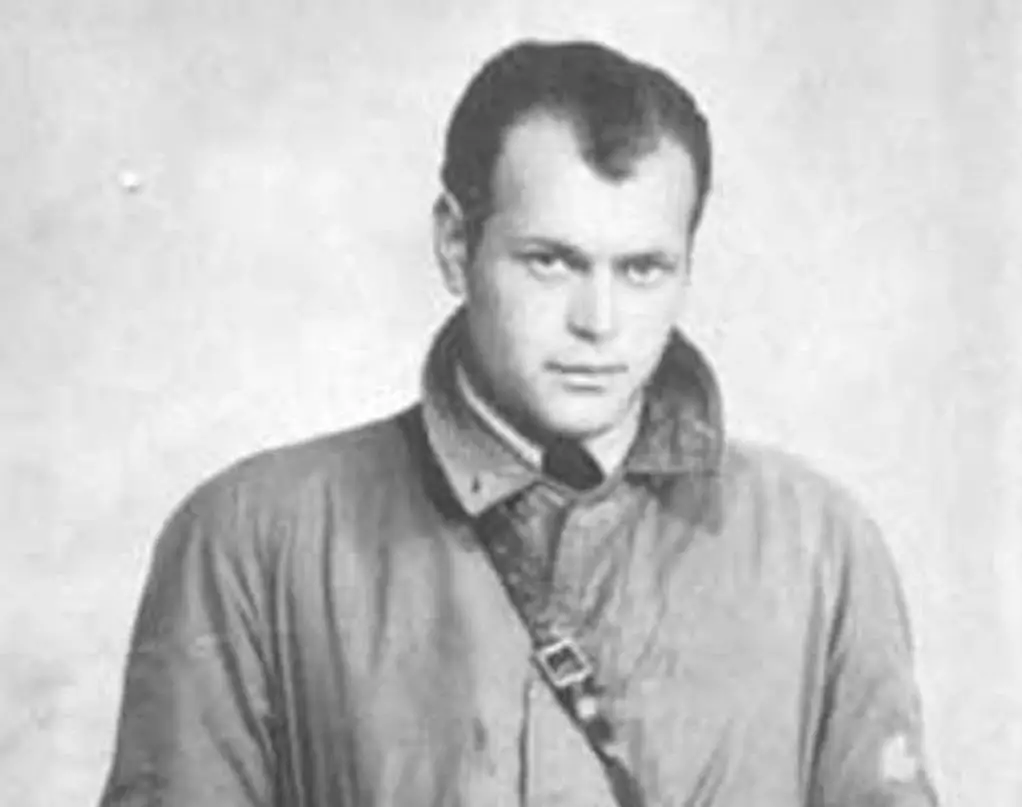
Silvio Corbari
By the end of 1942, Corbari was married and had a daughter. Like many of his fellow countrymen, he was called up for military service. During the period of his life spent in the army, he experienced considerable problems due to his contempt for authority, especially when his platoon was ordered to perform parade drills in front of the Fascist leaders. It was something that he steadfastly refused. Thus, on more than one occasion, Corbari was sentenced to spend a few days in the Army jail of Faenza.
Related: Italian Social Republic: German Puppet State in Northern Italy
Related: Co-Belligerent Italy: 1944-1945
During this time Corbari’s anti-fascist beliefs strengthened. He began to contact and recruit others with likeminded views to form a small clandestine outfit. So, when Mussolini was deposed on July 25, 1943, Corbari already was the established leader of his own little anti-fascist group.
The Birth of the Partisan Brigade
For most of the summer of 1943, the group did little more than partake in some street brawls against some disbanded Blackshirt members. But this situation changed drastically when Italy signed the Armistice with the Allied powers on September 8, 1943.
The Regio Esercito local command of Faenza was left without any orders from the high command, as was most Army units across all of Italy. The fundamental unanswered question facing local Army commanders was whether they were to resist the Germans and engage on sight or were they to allow the Germans to pass north to escape the Allied advance. Shortly after the announcement of the Armistice, a German column, which greatly outgunned the Italian forces, was spotted heading towards the city. To avoid capture and imprisonment since the Italian forces had no orders, the Commander disbanded the army units inside the city.
Corbari realized this was the right time to transform his group into a true fighting formation. In the days that followed, Corbari and his men conducted a raid to collect as many weapons and ammunition as possible. The Germans set up to occupy the city in force, so Corbari’s group moved to the mountains outside of the town after completing their supply raids.
It was here Corbari met a group of officers and soldiers who were trying to form the first nucleus of organized resistance. So he decided to join them. Shortly thereafter, a partisan brigade was created. The brigade consisted of two companies; Corbari and his group were assigned the one called “Compagnia della Samoggia”. They were only 35 men. However thanks to Corbari’s foresight, they had 7 heavy machine guns, 30 light machine guns, 100 Mod. 91 rifles, handguns, and several hundred hand grenades.
Typically, a Partisan brigade had a structure based on two commanding figures; the military commander and the political commissioner. The military commander was usually a former officer of the Regio Esercito whose responsibilities were the plan of actions, unit organization, gun distribution and so forth. The political commissioner was often a civilian who represented the National Liberation Committee (C.L.N.) which was the union of all the anti-fascist parties.
Since C.L.N. was practically the Comando Supremo of the partisan units, the political commissioner acted as a liaison officer who submitted to the C.L.N. approval request on important operations. They were also responsible for keeping contact with various intelligence units and the clandestine organization called S.A.P. (Patriotic Action Squads). The S.A.P was composed of civilians who appeared outwardly to live a common life, but actually secretly worked for the resistance.
First Target: Mussolini
In late September 1943, after being freed from captivity by German paratroopers and whisked off to Germany to meet Hitler, Mussolini returned to German-RSI controlled northern Italy and his home located at Rocca delle Caminate. This location was just inside the operative zone of “Della Samoggia” company.
Corbari, who favored “commando” type actions, immediately devised and presented his command a detailed plan to kill Mussolini during a meeting he was to attend at the Grand Hotel of Castrocaro. The plan was rejected as it was deemed too risky. But Corbari wasn’t discouraged and devised another plan to assassinate Mussolini at Rocca delle Caminate.
This time Corbari tried even harder to convince both his command and the C.L.N. to act immediately before Mussolini’s escort became more reinforced. Even though the military commander supported his plan, the C.L.N. wavered too much. Thus this suggested operation was also discarded. After a fierce dispute, he abandoned the brigade and was followed quickly by a dozen other partisans loyal to him.
“Banda Corbari” and Iris Versari
Once he left the Brigade, Corbari formed a new and smaller partisan group in which his first rule was the total autonomy from the reins of political control. In fact, he didn’t accept any relation with the C.L.N. and even refused to establish the position of the political commissioner.
Given the smaller size of the group, the C.L.N. considered Corbari’s decision with indifference rather than with anger. Within a couple of months, however, the group increased in size with the addition of some recently freed Yugoslavian POW’s, who joined Corbari’s band. These men revealed an unexpected skill in guerrilla fighting tactics that helped the group achieve a series of very successful operations within a short range of time. Corbari’s fighters began to earn a reputation for being able to move silently, attack suddenly, violently, and then disappear as fast as they appeared.
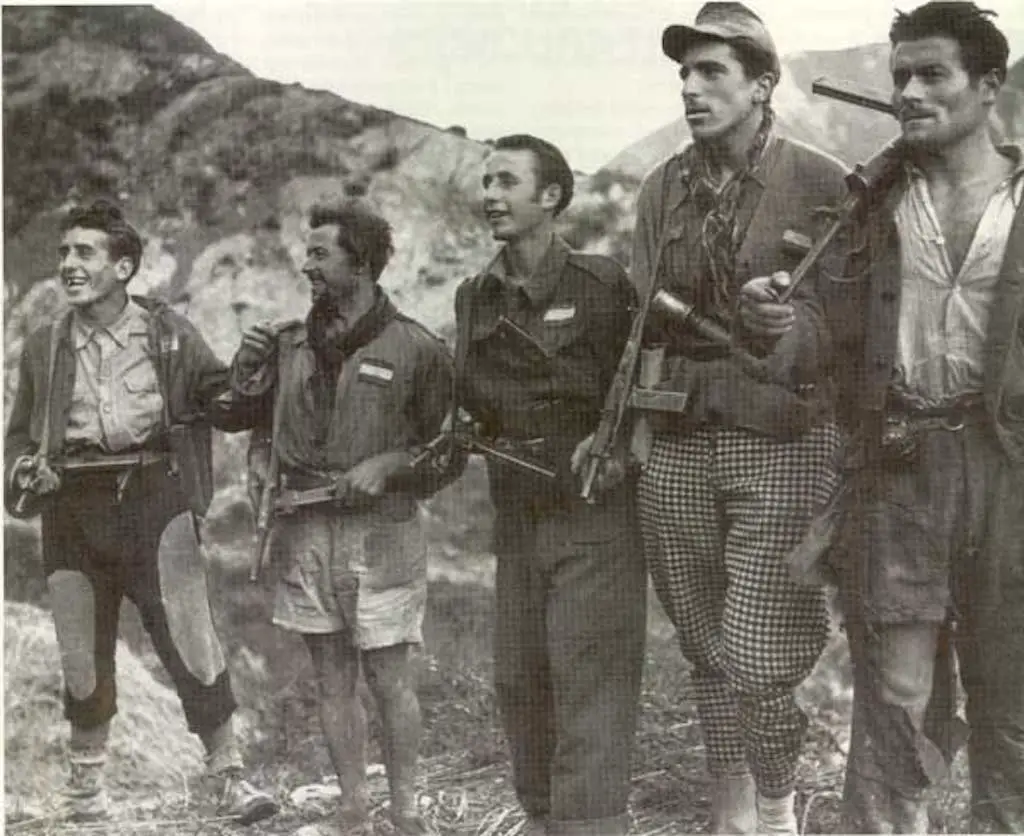
Members of the Corbari Brigade.
Soon the local civilians began to admire the group’s actions taken against the Germans. Meanwhile, the enemy began to fear this small group of partisans called “Banda Corbari”, much as if they were a common gang of thieves.
Around the same time as the Yugoslavians joined Banda Corbari, so did Iris Versari. Iris was an Italian girl who previously worked as a courier. When Corbari met Iris it was love at first sight. Although he was already married, they soon became an inseparable couple.
While the group continued building a respected military reputation, Corbari decided to adopt an additional strategy which he considered something comparable to propagandist-psychological warfare. Using his passion for stage jokes and deception, he devised a series of sensational actions designed to convince many undecided young men to join the resistance. It would also deliver the enemy a precise message; a partisan can be anyone, anywhere and can strike at any time.
Funny and Amazing Actions of Banda Corbari
Corbari decided to put his plan in motion by challenging to a duel the RSI secretary of Faenza. In his letter of challenge, Corbari defined the location as a church. He requested only one condition: both gentlemen were to arrive at the location without escorts or their guns. The secretary agreed to the duel and arrived at the church at the established time. Breaking his word, the secretary had his escort secretly and inconspicuously surrounded the building earlier in the day, but Corbari did not appear.
The secretary fumed as he waited inside the church, his anger rising by each passing minute when it became obvious to him that he had been stood up by Corbari. As he exited the church, he paused to ask an old beggar who sat on the church’s stairs if he had seen a young man around the building earlier. The beggar said no, and was rewarded by the secretary who tossed him some money for the information.
The following days the secretary spread the word about the apparent cowardice of Corbari, who had refused to show at the church for the duel. Soon after, the secretary received a letter containing some money and the message:
“I give you back the money that you generously donated to me, but you have to know that your life is what I’ve donated to you.”
Corbari had pulled off his first great acting performance of the war, at the expense of one angry and embarrassed RSI secretary.
A few days later, the city of Faenza was again thrust into turmoil as Corbari’s group publicly announced that a high explosive bomb was placed under the statue of General Pasi and would soon detonate. An RSI bomb squad was quickly sent from Bologna to handle the situation, but while defusing the device they found that the explosive consisted of nothing more than a pot of bean soup.
Thus, while the reputation of Corbari increased amongst the local population, the civilians began to laugh at the expense of Fascists, eroding their credibility.
Trying to stop the rising admiration for Corbari, the RSI command spread news through the city journal that Corbari had been killed during a firefight near San Giorgio in Cepparano.
The following Sunday a GNR officer entered into the most crowded cafè of Faenza, and ordered himself a coffee. He sat quietly in the bustling cafè amongst the locals and GNR soldiers likewise enjoying their beverages. Once he finished drinking his coffee, he slammed portraits of Mussolini and Ettore Muti to the ground and spat on them. The patrons of the cafe were no doubt stunned by this outburst, and it was only when the GNR officer took off his hat that everyone realized that he was Silvio Corbari. At that point, a couple of the GNR soldiers in the cafe attempted to react, but the cunning partisan drew his weapon and fired an entire SMG’s magazine in their direction, skillfully hurting no one but halting the men in their tracks. Corbari then quietly walked out the cafe door, his newly developed legend growing even stronger.
With his sensational actions, Corbari obtained the results he had hoped. Soon, more young men began to join him in his fight against the Fascist and German troops. By the end of 1943, the group was composed of more than 50 partisans. Now the commander of a true partisan’s brigade, Corbari devised an ambitious plan to further propel his cause.
On the morning of 9 January 1944, he led his men on the attack against the Fascist controlled town of Tredozio. While the town was small in size, it held an important crossroad vital to the Germans supply line. Corbari, commanding a company of 30 partisans, was able to quickly capture the Carabinieri post and the GNR garrison without suffering any losses to his men. The area was immediately proclaimed by Silvio Corbari as the Partisan Republic of Tredozio and was to stand under his ‘banner’ for 11 days, despite several enemy attacks.
During those days, Corbari in the role of city ‘Mayor’, redistributed to the poorest people the accumulated wheat from the GNR depots. He also destroyed tax and military service records held in the town.
On 20 January, the short-lived Republic of Tredozio came to an end. After receiving a tip. a GNR brigade attacked a farm known as Cà Morelli, where several of the partisan fighters in the “Republic” were hiding. The GNR prevailed, and the fighting left about 20 of the partisans dead. Less than a week later, a fascist police squad burst into the house of Iris Versari, and arrested the entire family minus Iris, who escaped the raid by jumping out from a window and fleeing to safety.
Her brothers spent over 40 days in jail and her mother was deported to the Dachau lager, where she was fortunate to survive her confinement. Her father was deported into the Buchenwald lager, where he perished in captivity.
The creation of the ‘ Republic of Tredozio’, while serving the strategic purpose of interrupting the GNR-German supply route, increased the popularity and reputation of his partisan group, while also giving hope to those who longed for true freedom.
The Ghost Truck
These losses were a severe blow, both personally and operationally, for Iris and Silvio. But they did not prevent them from continuing to fight for their cause. In February the band ‘recaptured’ Tredozio from the Fascist two more times, but they were unable to hold the town for more than two or three days on each occasion.
In the same month, Corbari and his men captured a group of GNR soldiers and their truck. Corbari would not let this golden opportunity go to waste. The partisans, perfectly disguised as GNR soldiers, used the truck to attack small garrisons and roadblocks along the road between Emilia Romagna and Tuscany. Deceived by the friendly approach of the “fake” GNR soldiers in their truck, more than 15 enemy targets fell within two days during this masterful deception. The truck was successively hidden after each raid and then used again for similar actions. For a time, the partisans were also known as “The Band of the Ghost Truck”.
During that same period, Silvio Corbari’s band occupied several other towns in nearby Faenza, usually for one or two days, before relinquishing control. Corbari and his men were becoming masters of hit and run style guerrilla fighting. One of the notable aspects of these occupations was a recurring task undertaken by Iris Versari, who often went to the local bank of the town and absconded with all of the cash. A part of the money was held by the brigade for its sustenance, and the rest was distributed to the poor of the town. Iris maintained IOU receipts for the money and goods held by the brigade. Incidentally, when the war ended, the Allied Command repaid these towns all of the IOU receipts ‘owed’, classifying them as “war expenses”.
Once again Tredozio
After the two occupations of Tredozio, the Wehrmacht Command was forced to place a company within the town, in addition to the GNR garrison previously positioned there to protect the crossroad. As soon as he became aware of this development, Corbari wrote to the Wehrmacht commander announcing his intention to visit him in the following days. The Germans reacted by setting up several checkpoints around the town. They were determined to capture the scourge of Tredozio.
A week later an old farmer walked down the main street of Tredozio dragging behind him a large pig by a rope. As he stopped in front of a tavern, the farmer asked a couple of nearby German soldiers if they could watch his pig while he went inside to drink a glass of wine. The Germans agreed, and the farmer shuffled off into the tavern to enjoy his vino. After the drink, the farmer emerged from the tavern, thanked the soldiers and walked away with his pig trailing behind him.
Some days later the German commander received a letter stating:
“Since your men are unable to catch a partisan, I humbly suggest you employ them as pork guards. This is the only job that suits them.”.
One can only imagine the look on Silvio’s face as he sat in the tavern that day drinking his wine. A wanted man reclining mere feet away from two of Hitler’s ‘fiercest soldiers’, who instead of seizing the ‘fugitive’ Corbari, stood outside in the sun guarding his hog. This was Silvio Corbari as his best.
The Murder of Gustavo Marabini, MVSN Consul
In April 1944, Corbari secretly sent word out to the local Fascist HQ requesting to establish an unexpected treaty with the MVSN General Consul Gustavo Marabini, the most prominent member of the RSI in Emilia Romagna. Corbari claimed that he was tired of a clandestine life on the run, and wanted to negotiate an honorable surrender for Iris and himself. Marabini accepted, and in exchange for the two abandoning their partisan cause, he offered Iris a position of responsibility in the Red Cross, and to Corbari the rank of commander in a GNR Brigade.
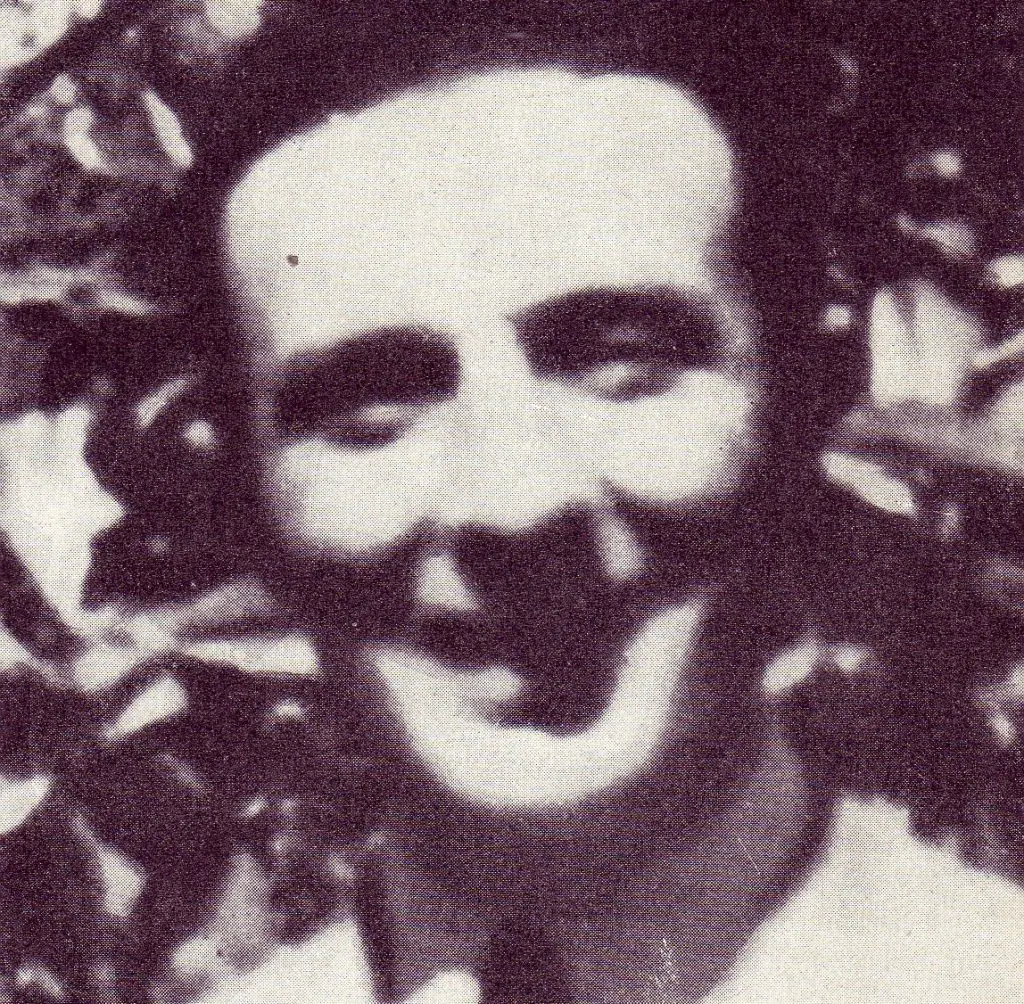
MVSN General Consul Gustavo Marabini
That proposal was accepted by the two partisans, and they arranged a secret meeting with Marabini to formalize the accord. The agreement called for Corbari and Iris to meet Marabini in an open meadow, and from here they were subsequently scheduled to travel together in Marabini’s car to Rocca delle Caminate, to meet Mussolini and finalize the deal. The initial rendezvous in the meadow took place as scheduled, but during the trip to Rocca delle Caminate, mayhem erupted in the back seat of the car. Iris suddenly pulled out a gun she had hid on her person and tossed it to Corbari who immediately shot Marabini in the neck and killing him. In an instant, Corbari the actor had transformed himself into a new role once again; a cold-blooded assassin.
This act echoed tremendously throughout the RSI, for Corbari had struck the establishment very close to its heart. Thus, after this execution, the RSI put a bounty of 30.000 lire on the head of Corbari. He was now one of the most wanted men in all of RSI controlled Italy.
Spring – Summer 1944
In spring 1944 the RSI, desperately looking for new soldiers, enacted a measure that inadvertently became Corbari’s biggest partisan recruitment tool to date. The RSI extended mandatory conscription until the class of 1926. They then instituted the death penalty for those ‘draft dodgers’ who subsequently failed to enlist. This measure caused the opposite effect that the RSI had hoped for. In fact, a mass of young men left their homes and joined the resistance to fight against them.
Antonio and Arturo Spazzoli
The Banda Corbari benefited greatly from a surge in volunteers in May-June 1944 that allowed for the creation of eight new companies. These inexperienced recruits were trained by the older partisans. This included Antonio Spazzoli, a WWI hero who joined the brigade along with his brother Arturo.
The Spazzoli brothers were outstanding in their craft and were very valuable members fighting for Corbari’s unit. They were also separately involved in many secret missions working together with field operatives from British intelligence. The \ Spazzoli brothers were an integral part of Corbari’s partisans. Consequently, they suffered a terrible blow when a German ambush captured Antonio and duly imprisoned by Nazi forces. Despite the torture he endured during captivity in an attempt to break him, he never revealed any information about the group’s operations or betrayed his fellow partisans.
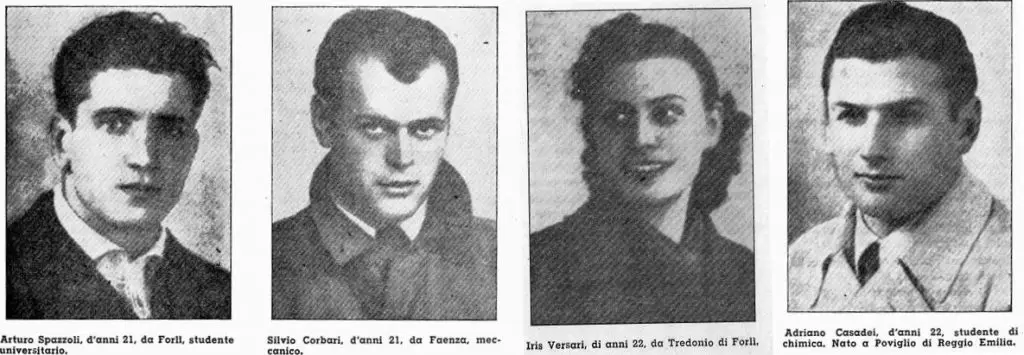
Adriano Casadei
During that spring, Adriano Casadei, a 22 year old local boy, joined the Brigade. Soon after, Casadei revealed an unexpected ability in formulating military strategy and tactics. This allowed him to quickly become the commander of a company, and become a devoted friend and confidant of Corbari. A couple of months after his arrival, the “newcomer” Casadei devised and then implemented one of the most famous actions ever undertaken by Corbari’s Brigade.
Knowing that the radio transmissions from the brigade were being intercepted by the Germans, Casadei sent a signal requesting Allied Command to air-drop of supplies. He asked for guns and ammo, and a large number of explosives, indicating to his Allied contacts the desire to destroy some bridges in the area. After several requests, the Allied Command confirmed the “rendezvous” and designated the drop to take place the night of July 10 on the crest of Monte Lavane.
The German’s intercepted this message, and their command was thrilled. They believed they now had an opportunity to deliver a devastating blow against the Corbari’s Brigade.
As the day of the airdrop arrived, the Germans prepared their assault team for the surprise raid. However, Corbari’s men prepared something in turn for their countries occupiers. Casadei and two squads of partisans had been hiding on the mount since early that afternoon. As soon as the packets were dropped from Allied planes, the men moved out from their seclusion and collected the supplies. One of Casadei’s squads secured all the guns and ammunition and moved away quickly from the drop zone and disappeared into the surroundings. The other squad grouped together all the explosives and gathered them in a nearby cowshed.
While the partisans were busy on the summit, two columns of SS and Alpenjagers arrived at the base of the mount and began the ascension up the incline. When the Germans reached the clearing, they saw no sign of partisan activity but noticed a lamp lit inside a cowshed in the distance. A squadron of soldiers was silently dispatched to surround the structure and capture the partisans inside.
The German troops moved closer to the shed and fell right into Casadei’s trap. Sheltered behind a crop of rocks, Casadei and a handful of men patiently watched as the German troops moved into the shadow of the cowshed. Casadei ignited the fuse. Moments later, a tremendous explosion burst forth from the shed obliterating the area. The Germans caught in the blast suffered 80 dead and more than 100 wounded.
The following day the BBC World Service, known in Italy as “Radio Londra” spoke of the action and praised the partisan brigade commanded by Corbari. It was to be one of the deadliest attacks against Nazi forces by Italian partisans.
Death of Silvio Corbari, Iris and their friends
Following the action on Monte Lavane, both the Germans and RSI intensified their hunt for Corbari and his men. Corbari decided to move the Brigade’s HQ to a secluded area, far from his troops. This strategy was often used by partisan formations due to the unlikelihood of a simultaneous enemy attack on two different locations.
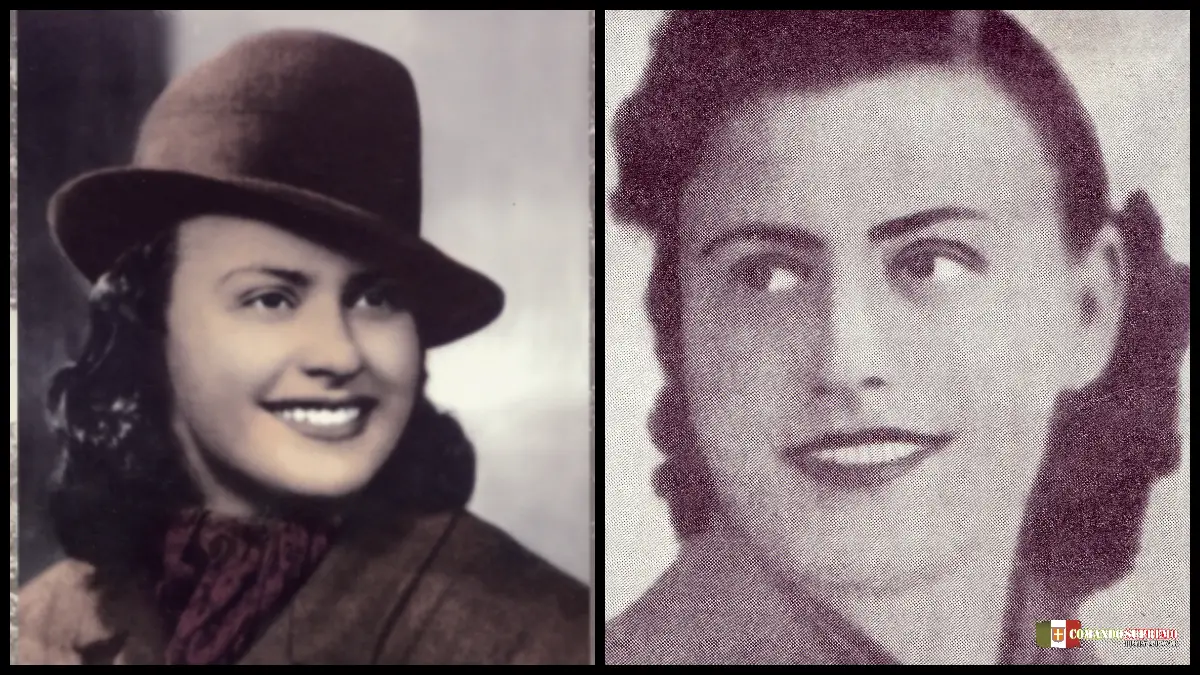
Iris Versari
So for some weeks, Corbari, Iris, Casadei, and Spazzoli laid low while living in a small house secluded in the woods. They kept in contact with the brigade using several couriers. In the first days of August 1944, during a routine reconnaissance around the HQ area, Casadei and Spazzoli came upon Franco Rossi, a young man who claimed to be a partisan who escaped from prison. Corbari took him in, and Rossi was sheltered for several days in the HQ. One day, however, Rossi disappeared with a customized MAB SMG belonging to Iris Versari. Iris maintained a Sten as a backup gun, but a couple of days after Rossi’s disappearance she accidentally shot herself in the leg, most likely due to her inexperience with this weapon.
Perhaps underestimating the risk of Rossi’s disappearance, Corbari did not move away from the current HQ. The partisan leaders remained at the cabin. The fact that Iris suffered a leg wound most likely played a factor in Corbari’s decision to stay. This decision would prove to be Corbari’s fatal mistake.
In the early morning of August 18, 1944, units of the Italian Battaglione M and German Alpenjager, guided by Franco Rossi, burst into Corbari’s HQ. Caught by surprise, the partisans tried to resist but were overwhelmed by the sheer number of attackers. The confrontation inside the cabin was quick and deadly. Iris, pinned on her bed, shot herself in the head before she could be captured.
Corbari, seeing his love slump over dead was devastated. Silvio quickly regrouped as best he could, and realized he would need to try and fight his way out of the cabin to survive. He jumped out from a window, shooting at his attackers as he leaped in an attempt to run into the surrounding woods. He was quickly hit by several bullets, but still kept moving. Staggering from his wounds, he fell into a nearby ravine fatally striking his head on the rocks below. Silvio Corbari, a hero to so many, was dead.
Arturo Spazzoli had his legs shattered by an initial burst of machine-gun fire and had fallen where he had stood. Lying immobile on the floor, he was immediately executed. The loyal Casadei initially made good on his escape but was captured uninjured when he returned in an attempt to rescue Corbari.
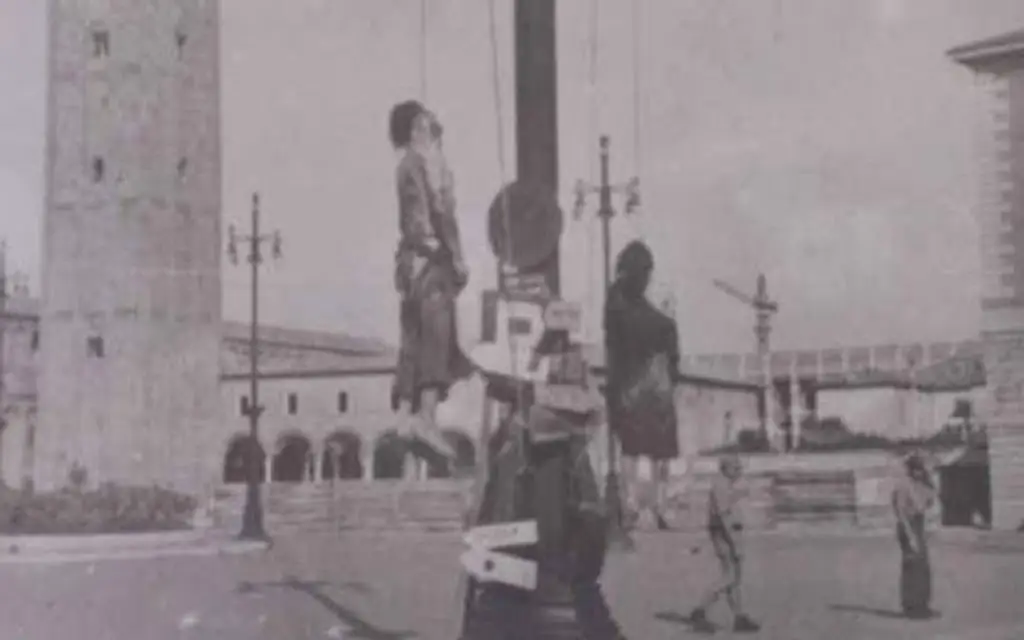
A photo of Silvio Corbari, Isis Versari and others hanging.
Casadei, along with the corpses of Corbari and the other partisans, were taken to the main square in Castrocaro where they were hanged. In the afternoon, the corpses were moved to the public square in Forlì where they were hanged once again, left there to sway in the wind for several days. Antonio Spazzoli, brother of Arturo, was led from the prison to Forlì where he was likewise executed.
This was the tragic end of the brigade’s command, but it did not mean the end of the brigade as a fighting unit. The partisan troops were able to stay united for several weeks even without commanders until Bruno Corbari, elder brother of Silvio, became its new leader. During that time, a new surge of partisan volunteers allowed the formation of eight more companies, doubling the previous total. In October 1944 the Brigade was renamed “Battaglione Silvio Corbari”, and in his honor continued the fight for freedom until the end of the war.
Immediately after the war, the President of the Italian Republic awarded Silvio Corbari, Adriano Casadei and Antonio Spazzoli with the gold medal for military valor. Many years later, Iris Versari was also awarded the same decoration. Some sources report that Arturo Spazzoli also was awarded a medal by the British Army for having helped rescue many British troops caught behind enemy lines.
Another Side of the Story
Although over the years the legend of Silvio Corbari has grown, there remain questions left unanswered.
Without a doubt, Corbari was a clever man who had a decent education and basic military training. But for some, this alone is not enough to explain the excellence of his achievements. For example, the outstanding military effectiveness of his brigade, especially during the genesis of the group. Many have stated that Corbari knew and applied concepts that were known only by members of Special Forces or intelligence agents. The question often asked when discussing Corbari is who trained him?
But perhaps the biggest mystery surrounding Corbari was the treaty and successive murder of Gustavo Marabini. Why did the MVSN Consul accept a meeting with Corbari and even to go so far as to sit in the same car with him? Was there more to this agreement and operation than is known? We know that Marabini was a spokesman for Benito Mussolini, but was Corbari, in turn, the spokesman for someone else higher up? Or perhaps was Marabini set up for this hit by someone on his own side?
Questions also linger over the circumstances of the death of Corbari and his command team. Who directed Franco Rossi to Corbari’s HQ where the partisans found him? Why were Corbari and the other partisans not alarmed after Rossi’s disappearance? Did they just write him off as a deserter, a reasonable assumption concerning a man they hardly knew? If so, this underestimation was a huge mistake that proved deadly.
There are some historians who have formulated an account of Corbari which is slightly different from the popular one. They allege that in October – November 1943, Corbari made contact with elements of Russian intelligence who were working covertly inside Italy. It would be through the ties with this organization that his brigade accomplished so much. They also theorize that the Yugoslavian POWs who joined the brigade were actually Russian SMERSH agents and that Iris Versari had been their contact and possibly a Russian agent herself.
Corbari was brave and daring without a doubt, but also young and inexperienced. The theory goes that the Russians felt he was the ideal man for them to work through. His brigade, not being politically controlled, offered SMERSH more leeway than other brigades, included the communist ones. It would have been through these Russian agents that Corbari learned how to train and employ his partisans like commandos, and to conduct operations in such an efficient manner. Some speculate that the treaty with Marabini was orchestrated by the Russians, who were attempting to open a dialog with Mussolini. But Corbari’s deep hatred of Fascism and his impulsive nature got the better of him. He seized this unique chance to gun down such a high ranking member of the Fascist Party.
They go on to reason that the Russians would not have cared for the Spazzoli brothers due to their relationship with British intelligence. This would have been a potential conflict of interest with their future goals for the Italian political establishment after the war ends.
It goes to reason that if the Russians had set up the meeting with Marabini, the failure of this encounter in terms of establishing a direct line of communication with Mussolini would have been a major disappointment. Factor in the arrest of Antonio Spazzoli and the fear that he might compromise their operation; it’s easy to see how the Russians would begin to have some doubt about the reliability of Corbari and Iris if one were to put stock in this theory.
Was Franco Rossi sent by the Russians to survey the HQ and then betray Corbari and his crew? As proponents of this theory point out, the partisan command was attacked just a few days before the planned assassination attempt on Mussolini. Additionally, all the captured partisans were killed without being interrogated, a most unusual thing.
There is no solid proof at this time to back this theory. Even if Corbari had Russian intelligence backing him, it was still his skill, bravery, and daring that pulled off these missions. One can say the mystery surrounding the life and death of Silvio Corbari still remains intact. Perhaps this is the way it should remain.
The older generation who continue to live in a once hotly contested section of Italy still discuss Silvio, Iris and their friends with love and respect. During those dark, confusing and turbulent days of the war, the actions of Silvio Corbari gave many a sense of hope and pride. He had become a rebellion incarnate. Due to the Brigade’s sensational and often mocking actions, combined with Corbari’s idea of absolute social justice, in the eyes of those civilians, that “gang” took revenge against a regime that exploited and oppressed Italy for more than 20 years. Silvio Corbari stood against a reign of tyranny and gave voice to a people who had none.
Note: Thank you to TJ for your collaboration on this article.
References:
Pino Cacucci – Ribelli
“Silvio e Iris” in RAI Radio2 Broadcast “Storie” by Chiara Pacilli and Andrea Bajani
Aurora Borioni – Silvio Corbari ( School Essay for Liceo Scientifico Torricelli)
Massimo Novelli – Corbari, Iris, Casadei e gli altri
To learn more about the working conditions of farmhands during Fascism, I recommend reading several works by Paul R.Corner. For example: “Fascist agrarian policy and the Italian economy in the inter-war years”
Presidency of the Italian Republic
Decrees of awarding of gold medals for military valor:
Silvio Corbari: Gold Medal for Military Valor
Iris Versari: Gold Medal for Military Valor
Adriano Casadei: Gold Medal for Military Valor
Antonio Spazzoli: Gold Medal for Military Valor